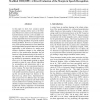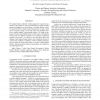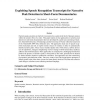2047 search results - page 97 / 410 » The limits of speech recognition |
EMNLP
2006
13 years 10 months ago
2006
This paper presents a corrective model for speech recognition of inflected languages. The model, based on a discriminative framework, incorporates word ngrams features as well as ...
ACL
2001
13 years 10 months ago
2001
Current alternatives for language modeling are statistical techniques based on large amounts of training data, and hand-crafted context-free or finite-state grammars that are diff...
ICML
2008
IEEE
14 years 9 months ago
2008
IEEE
In this paper we show how common speech recognition training criteria such as the Minimum Phone Error criterion or the Maximum Mutual Information criterion can be extended to inco...
ICASSP
2011
IEEE
13 years 16 days ago
2011
IEEE
The method which is called the “tandem approach” in speech recognition has been shown to increase performance by using classifier posterior probabilities as observations in a...
CLEF
2009
Springer
13 years 6 months ago
2009
Springer
Narrative peaks are points at which the viewer perceives a spike in the level of dramatic tension within the narrative flow of a video. This paper reports on four approaches to na...



